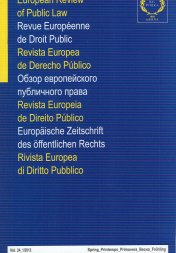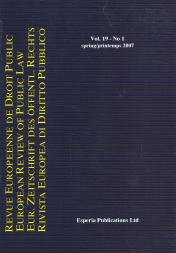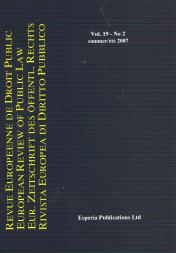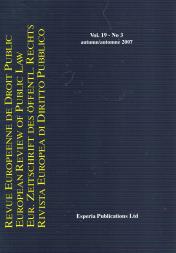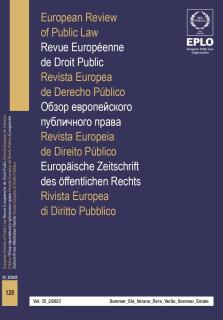
Constitutional Law / Droit constitutionnel gennaio-dicembre 2022
Italy / Italie
Chiara Martini
Dottore di ricerca in Diritto pubblico dell’economia
presso l’Università degli Studi di Roma “La Sapienza”
Francesca Tedde
Dottore di ricerca in Diritto Amministrativo, nella Facoltà di Giurisprudenza dell’Università degli Studi di Roma “La Sapienza” e funzionario amministrativo del Ministero della difesa
The year 2022 begins with the re-election of President of the Republic Sergio Mattarella for a second term. The other possibility on the table would have been the election of Prime Minister Mario Draghi as Head of State, but this would have brought about the end of the executive led by him and would have forced the political forces into negotiations and consultations to form a new one. The impasse was resolved with Parliament’s decision to ask President Mattarella to accept a second mandate, maintaining the executive led by Draghi. And yet, the government’s political crisis came a few months later, brought about in particular by the unavailability of the Movimento 5 Stelle (M5S) to continue supporting government action on some specific points. Unsuccessful in his attempt to find a clarification, the President of the Republic dissolved the Chambers and convened the election rallies for 25 September. The electoral results were clear and decreed the victory of the centre-right coalition, which obtained around 44% of the votes, with the right-wing party Fratelli d’Italia being the political force with the best result at national level (26%). In light of the clear electoral result, the Head of State has given Giorgia Meloni, leader of Fratelli d’Italia, the task of forming the government. This is the first time in the history of Italy that a woman has been appointed Prime Minister.The executive’s action in the first months focused on measures, in continuity with the previous executive, aimed at countering the economic and social impact of inflation and the energy crisis on families and businesses. During the year, a referendum was held on five questions concerning justice, for which, however, the quorum was not reached.
L’année 2022 a commencé avec la réélection du président de la République Sergio Mattarella pour un second mandat. L’autre possibilité qui se présentait était l’élection du Premier ministre Mario Draghi à la tête de l’Etat, mais cela aurait entraîné la fin de l’exécutif qu’il dirigeait et contraint les forces politiques à entamer des négociations et des consultations pour en former un nouveau. Le problème a été résolu par la décision du Parlement de demander au président Mattarella d’accepter un second mandat, en maintenant l’exécutif dirigé par Draghi. Néanmoins, la crise politique gouvernementale est survenue quelques mois plus tard, provoquée notamment par le défaut de soutien du Movimento 5 Stelle (M5S) à l’action du gouvernement sur certains points précis. N’ayant pas réussi à clarifier la situation, le président de la République a dissout les Chambres et proclamé des élections pour le 25 septembre. Les résultats électoraux ont été nets et ont scellé la victoire de la coalition de centre-droit avec environ 44% des voix, le parti de droite Fratelli d’Italia étant la force politique qui a obtenu le meilleur résultat au niveau national (26%). Au vu de ce résultat électoral clair, le chef de l’Etat a confié à Giorgia Meloni, chef de file de Fratelli d’Italia, la tâche de former un gouvernement. C’est la première fois dans l’histoire de l’Italie qu’une femme a été nommée Premier ministre. Au cours des premiers mois, l’action de l’exécutif s’est concentrée sur des mesures situées dans la continuité de l’exécutif précédent, visant à contrer l’impact économique et social de l’inflation et de la crise énergétique sur les familles et les entreprises. Au cours de l’année, un référendum a été organisé sur cinq questions concernant la justice, mais le quorum n’a pas été atteint.
Il 2022 si apre con la rielezione del Presidente della Repubblica Sergio Mattarella per un secondo mandato. L’altra possibilità in campo sarebbe stata l’elezione del premier Mario Draghi a Capo dello Stato, ma ciò avrebbe determinato la fine dell’esecutivo da lui guidato e avrebbe costretto le forze politiche a trattative e consultazioni per formarne uno nuovo. L’impasse si è risolta con la scelta del Parlamento di chiedere al Presidente Mattarella di accettare un secondo mandato, mantenendo l’esecutivo guidato da Draghi. E tuttavia, la crisi politica del Governo è arrivata qualche mese più tardi, determinata in particolare dalla indisponibilità del Movimento 5 Stelle (M5S) a continuare a sostenere l’azione governativa su alcuni punti specifici. Naufragato il tentativo di trovare un chiarimento, il Presidente della Repubblica ha sciolto le Camere e convocato i comizi elettorali per il 25 settembre. I risultati elettorali sono netti e decretano la vittoria della coalizione di centro-destra, che ottiene circa il 44% dei voti, con il partito di destra Fratelli d'Italia che risulta la forza politica con il miglior risultato a livello nazionale (26%). Alla luce del chiaro esito elettorale, il Capo dello Stato ha conferito a Giorgia Meloni, leader di Fratelli d’Italia, l’incarico di formare il governo.Si tratta della prima volta, nella storia d’Italia, che una donna assume l’incarico di Presidente del Consiglio. L’azione dell’esecutivo nei primi mesi si è concentrata su misure, in continuità con il precedente esecutivo, volte a contrastare l’impatto economico e sociale dell’inflazione e della crisi energetica su famiglie e imprese. Nel corso dell’anno si è svolta una consultazione referendaria su cinque quesiti in materia di giustizia, per i quali tuttavia non è stato raggiunto il quorum di validità.
* Il presente lavoro costituisce il risultato di uno sforzo congiunto e condiviso. Tuttavia, le responsabilità individuali possono ripartirsi come segue: Chiara Martini ha curato i paragrafi 1, 2, 4 e 5; Francesca Tedde ha curato i paragrafi 3 e 6.














